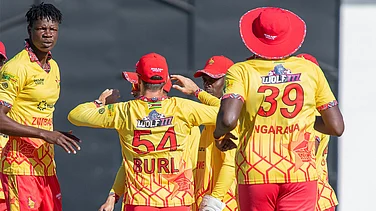But the DDCA is not the only one giving sleepless nights to the organisers as the clock ticks away towards cricket's D-Day. The stadium collapse at Nagpur during the fourth one-day international against New Zealand on November 26, which left nine spectators dead and scores injured, has put a question mark on the Vidharbha Cricket Association as well. Nagpur is due to host the Zimbabwe-Australia tie on March 1 and it, too, has been given a December 31 deadline to get its act together.
For years, infighting in the DDCA has ensured that the Capital's cricket stadium remains far below international standards. Conditions at the Kotla grounds have gone from bad to worse and the Board of Control for Cricket in India (BCCI) has in the past bypassed the DDCA and staged international matches at the Nehru stadium. The latter was built for the 1982 Asian Games and is obviously unsuitable for cricket. In fact, the BCCI and the DDCA appeared to be on a collision course when venues were allotted for the World Cup and the Kotla was once again in danger of being given the go-by.
The ultimatum by Indcom, the Indian committee overseeing preparations for the World Cup, to shape up or ship out jolted the DDCA out of its slumber. The demand: build one floor for the teams' dressing rooms, one floor for the print media and, on top of that, space for TV camera crews.
Construction work was halted by the Municipal Corporation of Delhi on December 7 as written permission had not been obtained from them and from the city's Urban Affairs and Employment Ministry. Sources in the DDCA claim that the authorities were tipped off by members of a rival faction within the strife-ridden association. Work was resumed after a lapse of two weeks at the intervention of Delhi Chief Minister Madan Lal Khurana. Union Urban Development Minister R.K. Dhawan subsequently had a no-objection certificate issued. But notwithstanding the offi-cial optimism, the break could prove fatal.
Says Indcom Convenor General and BCCI Secretary Jagmohan Dalmiya: "The whole idea in the first place in allotting venues was not to shift them later on. We have given instructions to the party concerned that all efforts must be made to ensure that the renovation work is completed on schedule. But the position will be reviewed again on December 31 to see the progress and gauge if it is possible to hold the match here."
While Indcom has contingency plans in case Delhi and Nagpur fail to make the grade in time, Dalmiya is playing his cards close to his chest. "We do not want to discuss alternate venues at this stage as we are confident that all will be well," he said soon after inspecting the Kotla.
Despite the brave front, Indcom has formed a panel to examine the prospects of alternative centres to replace Delhi and Nagpur. The panel consists of Indcom chairman Madhavrao Scindia, Board president I.S. Bindra and Dalmiya.
But there is already criticism against the BCCI for choosing l7 different venues for the l7 matches in India. Pakistan, by comparison, will stage l6 ties at just six venues. Sri Lanka is to host three in Colombo and one in Kandy. Dalmiya's justification: India has many more stadia of international standard. A stand belied by the recent setbacks.
Former captains S. Venkataraghavan, Sunil Gavaskar, Ravi Shastri and Kapil Dev had been deputed by the Board to inspect the venues. Guwahati was rejected by Shastri as he felt it lacked adequate infrastructure, leading to a cold war between the Assam Cricket Association and the parent body. Mohali, Gwalior, Bombay, Madras and Bangalore are on schedule to instal floodlights, while Hyderabad and Calcutta already have this facility. Cricket lovers in Delhi and Nagpur are keeping their fingers crossed, hoping against hope for light at the end of the tunnel.






















